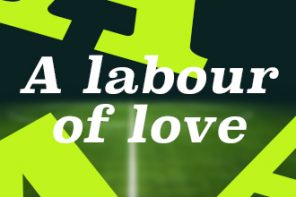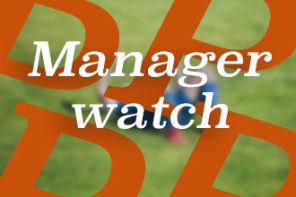The recent news of Djibril Cisse’s retirement has provided a welcome distraction for AJ Auxerre. The 35-year-old striker made his name at the club with 70 goals in 128 games before joining Liverpool in 2004. Back then, Auxerre were a force to be reckoned with, both at home and in European competition. But now they are faced with relegation from Ligue 2, in a campaign littered with on-field disappointment and embarrassing off-field bickering.
With typical crowds below the 5,000 mark this season, Auxerre have drifted out of the spotlight since their 32-year stay in France’s top tier came to an end in 2012. But the media has been drawn to the current discord at the Stade de l’Abbé-Deschamps, and the two high-profile characters at the centre. In one corner is Ballon d’Or winner Jean-Pierre Papin, once of Marseille and AC Milan; in the other is Guy Roux, an Auxerre legend whose career as a player and manager at the club spanned five decades and saw the likes of Eric Cantona, Laurent Blanc, Philippe Mexès and Cissé come through the ranks.
With civil war brewing, Papin’s impending appointment as coach and sporting director by Auxerre’s new Chinese majority shareholders, Org Packaging, was stymied by Roux. After an association with the club that has lasted 55 years, he continues to cast a dominating influence.
At their peak, Auxerre won the French championship in 1996 and, just six years ago, welcomed AC Milan, Real Madrid and Ajax to their compact stadium in the Champions League group stage. Now the club stands on the brink of sliding back into obscurity.
Situated in the heart of France, in the Burgundy wine region, Auxerre is a small town from which many French stereotypes have been born. It is the land of snails, beef bourguignon and Chablis. Until relatively recently, it was not the type of place that could sustain a professional football team – let alone the champions of France.
It’s for that reason that the heights Auxerre have reached, and the duration over which they have been achieved, can be considered even more remarkable. With a population of around 40,000 citizens, this quaint little town has prospered beyond what seemed possible. Since 1980, they have played over 1000 Ligue 1 matches and more than 100 games in European football, reaching the quarter-finals of the Champions League in 1997, the year after winning the French title.
Much of that success can be attributed to the singular ambition, industry and vision of Roux, one of French football’s ultimate icons.
Although he didn’t enjoy an estimable playing career, he was so enamoured with the game that he played for two clubs, AJ Auxerre and Stade Auxerrois, at the same time, turning out as a centre-half for the former and centre-forward for the latter.
Blessed with an enormous appetite for hard work, brought about in part due to the necessity of having to hold down multiple jobs to nurse his sick mother as a young man, Roux initially became a school teacher before moving into football. It was with AJ Auxerre that he soon found an outlet that could benefit most from his love of football and astounding work ethic.
The somewhat serendipitous nature of his first involvement with the club casts him as a trailblazer for Jose Mourinho. It was Roux’s ability to act as an interpreter when Auxerre played a friendly against Crewe Alexandra in England that prised open the door for him. At the time, the 21-year-old was playing for Limoges, but the directors were impressed with how he handled himself and offered him the chance to join the still amateur side.
They were no doubt taken aback by his next move, however, as Roux stated that he would only join if he could become player-coach. President Jean Garnault turned down the request at first, but was soon the recipient of a six-page dossier from the ambitious youngster that won him the job. Back then, Auxerre were perfectly anonymous, playing in regional football with little expectation that they would ever climb the league pyramid.
Almost literally, Roux built the club from there. He instructed the directors to buy their own stadium – they are one of only five professional teams in France to do so – and was inspired to form the club’s training academy when he saw a 14-year-old Jean-Marc Ferreri, who later became a European champion with France, playing in a local youth team.
Roux was more than just a player or coach; he became a genuine father figure. Ferrari, for example, may never have been able to sign for the club had he not been offered the chance to stay with Roux and his family, while the likes of Cantona, Mexes and Basile Boli have all spoken fondly of their former mentor. “France does not deserve Auxerre, England does, but not France,” Cantona once said.
1983 – A 17-year old Eric Cantona at Auxerre. pic.twitter.com/hlovSibaWR
— Old Days Football (@OldDaysFootball) February 5, 2017
Had fate dealt a different hand, Roux might well have succeeded France World Cup-winning coach Aime Jacquet in 1998, yet he remained at Auxerre until 2005, with a brief hiatus in 2000/01, before he returned after rejecting an offer to manage Bayer Leverkusen. Roux was not quite a one-club man – he had a short spell in charge of Lens in 2007 – but there is no-one in world football who can be said to have had such a stunning influence on one side over such a period.
It is no surprise, then, that Roux’s presence continues to be felt throughout the club, as Papin has found to his cost. Although Roux no longer has any official influence in the day-to-day running of Auxerre, he represents the AJA association, which retains a 40 per cent stake following the recent Chinese investment.
Papin, meanwhile, is the posterboy of new owners Org Packaging, the Chinese group led by James Zhou who bought into the club last October. He had even announced his appointment, telling BeIn Sports on January 12th: “I have signed a protocol to become coach, sporting director and ambassador of Auxerre. I will sign my contract on Monday, if everything goes to plan.”
It did not.
Even at that juncture, there were doubts surrounding Papin’s involvement, with club president Guy Cotret insisting he would not be installed as coach. The decisive play, however, was made by Roux’s AJA association, who did not want to see manager Cedric Daury replaced, a sentiment echoed by the players. Roux also made it clear that he didn’t feel Papin was up to the task of juggling three roles – who better to know the stresses of performing a number of vital positions than the man who did so for over 40 years?
While Roux’s coaching CV is impressive, Papin’s has largely been carried by his reputation as a player. He attained some measure of success at Strasbourg, where he won promotion to the top flight in his sole season in charge, yet he left the club amid public conflict with the players. He then replaced Roux at Lens, where he suffered relegation, before undertaking a brief spell at Châteauroux in Ligue 2 in 2009/10.
Roux has described the prospect of Papin’s arrival at Auxerre as “inconsiderate spending”, given the reported salary of €1million per year – a princely wage for a side of dwindling stature. “We have a coach, Cedric Daury, who is our second of the season and our eighth since I retired in 2005,” Roux told local paper Yonne Republic. “He has earned the respect and friendship of all at AJA by the quality of his work and the heart he puts in it.”
These words burned the ears of Papin, who was quick to offer a riposte via Facebook, such is the modern means of communication. “Monsieur Guy Roux, you insult me and speak about me in a false and humiliating way in the media every day for practically a week,” the message began.
“Would you like us to talk about the team you left me in Lens? Of your salary at the time? Of the catastrophe you left for me that I had been unable to escape? Your great age probably made you forget my year in Strasbourg, where I won them promotion, and my half season when I saved la Berrichonne (Châteauroux) from the third division.”
Papin’s facts might not have been of the alternative variety, but they were certainly cherry picked. Nevertheless, he did serve a stern warning to Roux that he was “heading for trouble”.
Instead, it turns out it was Papin who picked the wrong battle. Roux may be long in the tooth, but he retains an untouchable aura at Auxerre that Papin was too naïve to appreciate. A deal that had once seemed watertight, despite the displeasure of the AJA association, swiftly fell to pieces.
The decision may well pay off. Under Daury, Auxerre have staged something of a revival in recent weeks, winning four of their last five fixtures in all competitions and progressing to the last 16 of the Coupe de France at the expense of Europa League hopefuls Saint-Etienne.
But the club that once shocked Arsenal with a 2-1 victory at Highbury in 2002 are by no means out of trouble yet, currently sitting one place above the bottom three. Roux has very rarely made a wrong call in 55 years; the club will hope he has got this one right, too.






